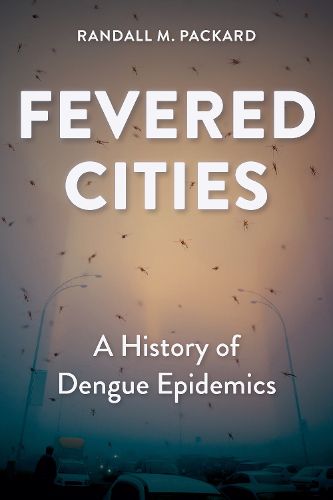Readings Newsletter
Become a Readings Member to make your shopping experience even easier.
Sign in or sign up for free!
You’re not far away from qualifying for FREE standard shipping within Australia
You’ve qualified for FREE standard shipping within Australia
The cart is loading…






A global history of dengue fever and humanity's ongoing struggle against this persistent disease.
In Fevered Cities, Randall M. Packard explores the complex and evolving history of dengue fever, the world's most widespread mosquito-borne viral disease. From its early manifestations in the eighteenth century to its current prevalence across more than one hundred countries, this book traces how dengue emerged as a global health challenge shaped by ecological, social, and economic conditions.
Packard examines the disease's spread through urban landscapes, focusing on specific cities like Philadelphia, Manila, Havana, and Rio de Janeiro to illustrate how local contexts have defined outbreaks and responses. He highlights the transformation of dengue from a poorly understood physiological ailment to a vector-borne disease tied to the Aedes aegypti mosquito, and later to more severe conditions like dengue hemorrhagic fever. As climate change expands the geographical range of mosquito habitats and global trade accelerates the movement of people and goods, this book explores the social inequities, unplanned urbanization, and environmental degradation that have made dengue increasingly difficult to control.
From vector control campaigns to cutting-edge biotechnologies like genetically modified mosquitoes and vaccines, Packard charts humanity's attempts to combat this tenacious disease. Fevered Cities is an essential history for public health experts, historians, and anyone concerned with the intersection of disease, society, and the built environment.
$9.00 standard shipping within Australia
FREE standard shipping within Australia for orders over $100.00
Express & International shipping calculated at checkout
Stock availability can be subject to change without notice. We recommend calling the shop or contacting our online team to check availability of low stock items. Please see our Shopping Online page for more details.
A global history of dengue fever and humanity's ongoing struggle against this persistent disease.
In Fevered Cities, Randall M. Packard explores the complex and evolving history of dengue fever, the world's most widespread mosquito-borne viral disease. From its early manifestations in the eighteenth century to its current prevalence across more than one hundred countries, this book traces how dengue emerged as a global health challenge shaped by ecological, social, and economic conditions.
Packard examines the disease's spread through urban landscapes, focusing on specific cities like Philadelphia, Manila, Havana, and Rio de Janeiro to illustrate how local contexts have defined outbreaks and responses. He highlights the transformation of dengue from a poorly understood physiological ailment to a vector-borne disease tied to the Aedes aegypti mosquito, and later to more severe conditions like dengue hemorrhagic fever. As climate change expands the geographical range of mosquito habitats and global trade accelerates the movement of people and goods, this book explores the social inequities, unplanned urbanization, and environmental degradation that have made dengue increasingly difficult to control.
From vector control campaigns to cutting-edge biotechnologies like genetically modified mosquitoes and vaccines, Packard charts humanity's attempts to combat this tenacious disease. Fevered Cities is an essential history for public health experts, historians, and anyone concerned with the intersection of disease, society, and the built environment.